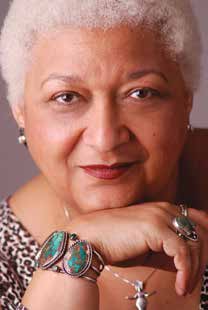
By Jewelle Gomez–
Gothic fiction and horror are, unfortunately, often dependent on the damsel in distress trope: the mad wife in the attic; the beautiful virgin who becomes the object of the vampire’s obsession, and even the little girl in the red hooded cape bouncing through the woods. So, it’s not a surprise that it took a while for women and queer writers to find our way through the forest of (white) male writers to a place at the table.
I’ll never forget my favorite rejection letter from a commercial publisher after the editor read my novel, The Gilda Stories, more than thirty years ago. He felt that a Black, lesbian vampire was “too complicated.” The truth that repelled him was that the female at the center didn’t need rescuing. Gilda was a power unto herself who repeatedly defeated the forces of evil patriarchy, whether it was rescuing herself from slavery or partnering with a widow to feed the hungry after World War 1, or outmaneuvering street thugs.
Thirty years after its publication, The Gilda Stories remains in print and received a legacy award from the Horror Writers of America (HWA), which comes with the best-looking award ever: a small, perfectly etched gothic castle. This year at StokerCon, the HWA annual convention, I looked around to see how centered we from the margins actually felt now.

It was in the panel about the roots of gothic fiction that I heard a panelist, novelist Jo Kaplan—author of an ingenious gothic western, When the Night Bells Ring—articulate why writing gothic/horror fiction would actually appeal to women and queer writers once the standard trope was removed. Gothic and horror’s pervading sense of anxiety as well as the imminent sensation of a looming precipice are feelings women, people of color, and queer people live with a good bit of the time.
There is also an underlying grief, which threads through the genre and that is also familiar to us. There have been, of course, some women, POC, and queers working in the genre for years. We all know Samuel R. Delany’s illustrious writing career, and I finally met Ellen Datlow, one of the renowned editors of horror anthologies in the business. But this year at StokerCon 24, I saw how strongly we’ve woven our thread through this tapestry.
In the panel on queerness and otherness, novelist Lindsay King-Miller (The Z Word) observed how much of queer culture combines things that on first glance don’t seem to go together, but they do fit. This was echoed in the panel featuring African American writers who speculated what a monster from Black culture would look like. Author Nisi Shawl (Kinning) saw the increased participation of those from the margins gives rise to new styles and concepts such as what she called “micopunk,” which is a style in which mushroom-type viruses infiltrate society. This is something I’ll have to consider for my next novella or next meal!
I didn’t turn into a bean counter, but noted that women, queers, and people of color were at StokerCon in reasonably healthy numbers. One of my faves was POC Justina Ireland, author of the spectacular zombie duo: Dread Nation, featuring the fiercest, scythe-wielding Black women in literature; and Deathless Divide, which has the hottest butch/femme cover ever!
Tananarive Due was a StokerCon winner in fiction for her new novel The Reformatory, a horror story deeply imbedded in a Black experience. Ridley Harker, whose novel Parasite was a Lambda Book award finalist last year, also attended, as did Sumiko Saulson, who put together a resource book of Black horror writers. They helped pull up the numbers of queers and people of color at the convention.

Linda Addison, an editor and author of horror poetry and a person of color, is always among the first to welcome new faces to the HWA. Unlike the editors who thought my main character was too complicated, she and others at StokerCon have helped create a place that welcomes complexity of identity and storytelling. And if you want to discuss them in costume—cool!
Jewelle Gomez is a lesbian/feminist activist, novelist, poet, and playwright. She’s written for “The Advocate,” “Ms. Magazine,” “Black Scholar,” “The San Francisco Chronicle,” “The New York Times,” and “The Village Voice.” Follow her on Instagram and Twitter @VampyreVamp
Leave Signs
Published on June 13, 2024
Recent Comments